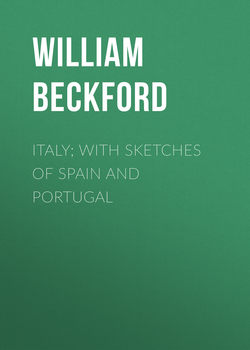Читать книгу Italy; with sketches of Spain and Portugal - Beckford William - Страница 19
ITALY LETTER VII
ОглавлениеCoast of Fusina. – The Brenta. – A Village of Palaces. – Fiesso. – Exquisite singing of the Galuzzi. – Marietta Cornaro. – Scenes of enchantment and fascination.
I was sorry to leave Venice, and regretted my peaceful excursions upon the Adriatic. No bright rays illuminated my departure, the sun was concealed in clouds; but the coolness and perfume of the air made ample amends for his absence.
About an hour’s rowing from the isle of Saint Giorgio in Alga, brought us to the coast of Fusina, right opposite the opening where the Brenta mixes with the sea. This river flows calmly between banks of verdure, crowned by poplars, with vines twining round every stalk, and depending from tree to tree in beautiful festoons. Beds of mint and iris clothe the brink of the stream, except where interrupted by a tall growth of reeds and osiers. The morning continued to lower as we advanced; scarce a wind ventured to breathe: all was still and placid as the surface of the river. No sound struck my ears except the bargemen hallooing to open the sluices, and deepen the water.
As yet I had not perceived an habitation, nor any other objects than green inclosures and fields of Turkish corn, shaded with vines and poplars. It grew late before we glided along by the Mira, a village of palaces, whose courts and gardens, as magnificent as statues, terraces, and vases can make them, are far from composing a rural prospect.
Such artificial scenery not engaging much of my attention, we stayed no longer than our dinner required, and reached the Dolo an hour before sunset. Passing the great sluices, whose gates opened with a thundering noise, we continued our course along the peaceful Brenta, winding its broad full stream through impenetrable copses. Day was about to close when we reached Fiesso; and it being a misty evening, I could scarcely distinguish the pompous façade of the Pisani palace. That of Cornaro, where we were engaged to sup, looks upon a broad mass of foliage which I contemplated with pleasure as it sank in the dusk.
We walked a long while under a pavilion stretched before the entrance, breathing the freshness of the wood after a shower which had lately fallen. The Galuzzi sang some of her father Ferandini’s compositions with surprising energy; her cheek was flushed, her eyes glistened; the whole tone of her countenance was that of a person rapt and inspired. I forgot both time and place while she was singing. The night stole imperceptibly away, before I awoke from my trance.
I do not recollect ever to have passed an evening, which every circumstance conspired to render so full of charm. In general, my musical pleasures suffer terrible abatements from the phlegm and stupidity of my neighbourhood; but here, every one seemed to catch the flame, and to listen with reciprocal delight. Marietta Cornaro, whose lively talents are the boast of the Venetians, threw quick around her the glancing fires of genius.
What with the song of the Galuzzi, and those intellectual meteors, I scarcely knew to what element I was transported, and doubted for several moments, whether I was not fallen into a celestial dream: to wake was painful, and it was not without much lingering reluctance I left these scenes of enchantment and fascination, repeating with melancholy earnestness that pathetic sonnet of Petrarch’s —
O giorno, o ora, o ultimo momento,
O stelle congiurate a’ impoverirme!
O fido sguardo, or che volei tu dirme,
Partend’ io, per non esser mai contento?
